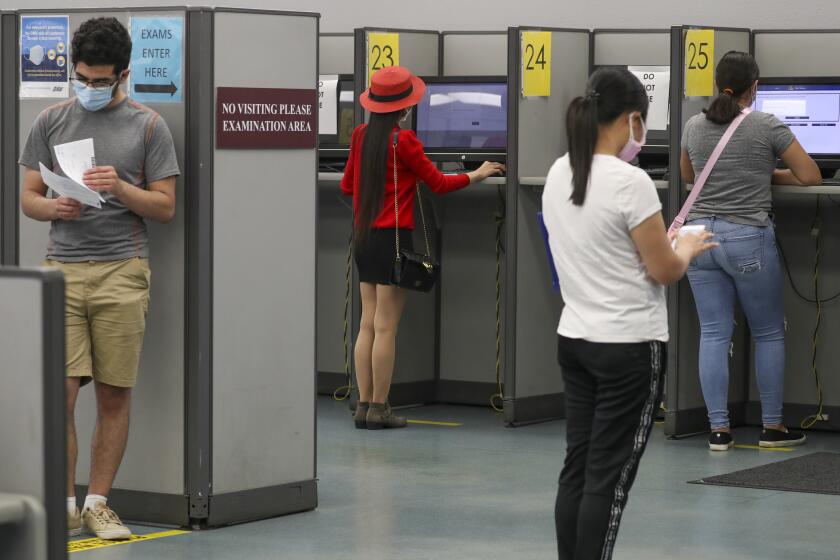Opinion: Lots of people lie to their doctors. My father did — with tragic results

My father and I only argued about one thing regularly: his driving. Because he had epilepsy.
In 1948, when my father was 17, he fell out of a moving car. He was in a coma for three days. A dime-sized titanium plate was put in his skull. Thirteen years later he started having both petit and grand mal seizures.
I was 9 years old when I first saw him have a seizure. He was driving the two of us in East Salinas and an elderly man with a cane was walking across the road. Suddenly my father slumped down with his head on his chest. The elderly man saw us coming at him. He rushed forward and tapped the side of our car with his cane as it nearly hit him. I knew nothing about cars but as we continued off the side of the road I slammed my left foot down on the brakes so hard we both smashed our heads against the windshield.
The Senate minority leader freezes on camera. Trump mixes up “Sioux Falls” and “Sioux City.” Those are natural parts of aging, and more people would get help if we discussed them openly.
That was the first of my father’s car accidents. His license was taken away after it happened. Despite being a rule-abiding person, he drove anyway. He didn’t do any of the other things he wasn’t supposed to do because of his epilepsy, such as swim, take baths or jog. Eventually he got his driver’s license back.
In those days epilepsy was treated with phenobarbital and Dilantin. My father hated taking them because they caused side effects including memory issues and receding gums. His solution was to cut the dose, which caused more seizures. Most of his seizures were small — only a few in his life were grand mal — and he told me that his triggers were not taking his meds, being exhausted, over-exercising, drinking alcohol and thinking about multiple things at once.
When I was in my 30s, my father became the principal at the school where he had taught for close to 10 years. I made a deal with his secretary that she would tell me when he had seizures. My family and I were surprised at how frequent they were, sometimes more than one a week. He’d never tell us about them.
Study guides and strategies: Older drivers have a few tips for those who must take the dreaded California DMV renewal test, with all its ‘obscure and ridiculous’ questions
Given how often he had seizures, and his periodic car accidents, we wondered how my father was able to keep his driver’s license. It turned out he lied to his doctor. As many people do, about all kinds of things. My father would tell his doctor he had been seizure-free for three months, and his doctor would indicate that on paperwork, which allowed him to keep his license.
My whole family agreed he shouldn’t drive. I would bring up the issue often, and he’d say, “If all of you had your way I’d be locked in a back room and do nothing.”
My father was stubborn and independent, both of which made him hold onto driving. But those are excuses — there’s no justification. Even though he lived alone he could have used public transportation, carpooled or asked us for rides.
In 1998, when he was 67, my father had his final seizure while driving. He caused an accident, killing the driver of the other car, and himself. The passenger in his car was severely injured and spent months in the hospital before she died. It was all shocking, unnecessary and horrible.
Telling Alec Baldwin ‘it was just an accident’ won’t help him deal with his guilt and despair. But there are steps he can take to find some peace.
I was the executor of his estate, what little there was of it after the legal fees and medical bills stemming from the crash. To disperse money to my father’s beneficiaries I had to close his bank account, which required presenting a death certificate at his bank. The woman assisting me said, “Your father was so young?”
“Car accident,” I said and then added: “He had a seizure while driving. He had no business driving. He killed other people.”
She looked horrified and turned pale. She looked around and then opened her desk drawer and took out two pill containers. She teared up as she showed them to me.
Phenobarbitol and Dilantin. She had epilepsy.
She said that she had two kids and that having an accident while driving was her greatest fear. We both started crying, and I thought that anyone watching us would think getting a loan at this bank must be tough as hell.
Not long ago I ran into an old friend. As we were catching up they told me they had been diagnosed with epilepsy a while back. They’ve told their doctor it’s been more than three months since their last seizure, and they are approved to drive. I can’t help but wonder whether what they told their doctor is true.
Paul Karrer is a writer in Monterey, Calif. He taught fifth grade in Castroville for 27 years and is the host of the podcast “Teacher Tails — Karrer Shorts.”
More to Read
A cure for the common opinion
Get thought-provoking perspectives with our weekly newsletter.
You may occasionally receive promotional content from the Los Angeles Times.












